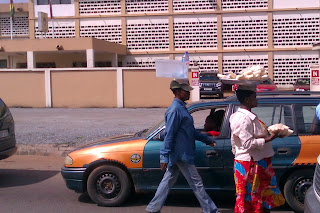As part of my quest to review the hardships average Ghanaians face in making a living in Accra, I caught up with this coconut seller in his late twenties, Edward; A.K.A 'Incubator', who hails from Gyankoboo in the central region of Ghana. He has lived in Accra for over 22 years. He has a fiancee that he has a two year child with her. He told me that he dropped out from senior high school as a result of his stubbornness.
'Coconuts are one of the wonder foods on earth that amply provides for all human needs and have multiple health benefits......... They can even save your life. Published studies in medical journals show that coconut, in one form or another, may provide a wide range of heart benefits. Because of its strong antioxidant properties and health benefits, the coconuts can be used to improve cholesterol ratio, thus, reducing risk of heart disease. It also improves digestion and absorption of other nutrients including vitamines, minerals, and amino acids. Further, it also kills bacteria that cause ulcers, throat infections, urinary tract infections, gum disease and cavities, pneumonia, gonorrhea, and other diseases' (Google search, health benefits of coconut).
'Incubator', as he is affectionately called by some of his customers started selling coconut when he was in junior high school. He has been in the business for over 10 years. On daily basis, he sells 150 Ghana cedis. Out of this sale, he makes a profit of 30 cedis. He also pays 5 cedis each for the coconut rubbish to be collected, and the truck he hires to sell his coconut.
Since every work has its occupational hazards and challenges, coconut selling is no exception. He told me that the work is stressful but lucrative. It is the only work that he does to look after his mother, fiancee and child as well as himself. He confided in me that officers from Accra Metropolitan Assembly (AMA) have made his work difficult. He lamented that sometimes he has to give the officers some money before he is allowed to sell at a particular place. Further, he accounted that more often than not, he experiences headache as a result of being in the scorching sun to sell. In addition, Edward nicked himself while peeling a coconut for a customer of which I witnessed.
Everyday, some average Ghanaians complain that the cost of living in Accra is very hard. With Edward, the cost of living in Accra is better than that in the village. As he rightly put it, 'here in Accra, if you work hard, you will get money to cater for your basic needs.' He however appealed to government to provide more jobs for them to be employed.



